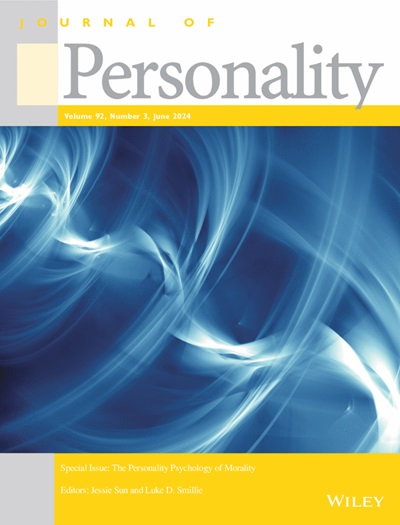叙事代理和共融作为特质和状态自尊动态的预测因子。
IF 2.7
1区 心理学
Q1 Psychology
引用次数: 0
摘要
自尊对生活结果有重要的影响,但在特质和状态层面上,对其前因知之甚少。我们从个人对过去转折点事件的叙述中考察了代理和共情作为特质自尊水平、长期特质变化和状态自尊的短期波动(不稳定)的预测因子。方法我们使用了一项为期2年的荷兰硕士生(N = 281, Mage = 24.5, 75%为女性)5波密集纵向研究的数据,跟踪他们从大学到工作的过渡。参与者完成了一份问卷,并在每一波中进行了为期14天的经验抽样评估。使用混合效果位置比例模型。结果在过渡初期,代理和交流与自尊呈正相关。虽然交流并不能预测状态自尊的不稳定性,但我们发现了一些证据,表明代理在几天内对自尊的不稳定性有负面预测,但在某些时刻却没有。结果既没有显示作为代理或共融功能的性状变化的差异,也没有显示总体变化轨迹的显著异质性。与交流相比,代理在学生的叙述中出现得更多。结论:工作转换期间,代理叙事对日常自尊不稳定有负向预测,但对瞬时自尊不稳定和特质变化的影响有限。本文章由计算机程序翻译,如有差异,请以英文原文为准。
Narrative Agency and Communion as Predictors of Trait and State Self-Esteem Dynamics.
INTRODUCTION
Self-esteem has important implications for life outcomes, yet little is known about its antecedents at both the trait and state levels. We examined agency and communion-coded from personal narratives about a past turning-point event-as predictors of trait self-esteem levels, long-term trait changes, and short-term fluctuations (instability) in state self-esteem.
METHODS
We used data from a 5-wave intensive longitudinal study of Dutch master's students (N = 281, Mage = 24.5, 75% females) over a 2-year period, tracking their university-to-work transition. Participants completed a questionnaire and 14-day experience sampling assessments at each wave. Mixed-effects location scale models were used.
RESULTS
Agency and communion were positively associated with self-esteem at the beginning of the transition. While communion did not predict instability in state self-esteem, we found some evidence for agency negatively predicting self-esteem instability across days but not across moments. Results neither revealed differences in trait changes as a function of agency or communion nor significant heterogeneity in change trajectories overall. Agency appeared more frequently in students' narratives compared to communion.
CONCLUSION
Results suggest that agentic but not communal narratives negatively predict daily self-esteem instability during the work transition but provide limited insight into momentary self-esteem instability and trait changes.
求助全文
通过发布文献求助,成功后即可免费获取论文全文。
去求助
来源期刊

Journal of Personality
PSYCHOLOGY, SOCIAL-
CiteScore
9.60
自引率
6.00%
发文量
100
期刊介绍:
Journal of Personality publishes scientific investigations in the field of personality. It focuses particularly on personality and behavior dynamics, personality development, and individual differences in the cognitive, affective, and interpersonal domains. The journal reflects and stimulates interest in the growth of new theoretical and methodological approaches in personality psychology.
 求助内容:
求助内容: 应助结果提醒方式:
应助结果提醒方式:


